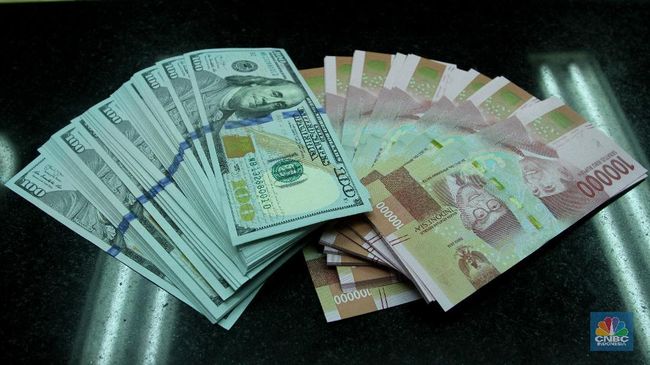Jakarta, CNBC Indonesia – Rupiah exchange rate battered against the United States dollar (US) on trade this week. This week the rupiah has weakened in 4 consecutive days.
Launched Refinitiv data, rupiah weakened 0.88% against the US dollar during the past week to the level IDR 14.860/US$ even on trading weekends drupiah appreciation had time swollen to 0.67% to Rp 14,920 / US $ which is the weakest level since May 14 and getting closer to the level IDR 15.000/US$.
The rupiah has come under pressure due to the total Large-Scale Social Restrictions (PSBB) that were re-implemented in Jakarta.
On Wednesday (9/9/2020) last night, DKI Jakarta Governor Anies Baswedan again announced the implementation of large-scale social restrictions (PSBB) in total starting September 14. The announcement had a shocking effect on trading Thursday (10/9/20), and it’s getting worse on the weekend (10/9/20).
Thus, Indonesia is almost certain to experience a recession this quarter. In fact, the gross domestic product (GDP) in the fourth quarter is also at risk of contracting if the total PSBB continues until next month. Understandably, Jakarta’s contribution to the formation of the national Gross Domestic Product (GDP) is the highest compared to other provinces.
Meanwhile, Minister of Finance Sri Mulyani Indrawati again reminded the risk of economic contraction in the third quarter of 2020. Sri Mulyani said that the third quarter will still be in the negative zone because the spread of Covid-19 continues to expand so that the social restriction policy is carried out again.
With this condition, Indonesia’s economic outlook this year was revised downward. Economic growth before Covid-19 is predicted to grow by 5.3% and currently is -1.1 to 0.2%.
The US dollar is actually also under pressure on week this, which made some major Asian currencies able to strengthen. This pressure was evident from the weakening US dollar index 0,43% for the past week. The index is a measure of the greenback’s strength.
Pressure on the US dollar occurred after the European Central Bank (ECB) did not change its policy in the announcement of its monetary policy meeting on Thursday (11/9/2020) yesterday. In fact, many analysts predict that there will be changes given that the eurozone economy is declining while the euro exchange rate continues to strengthen.
The central bank under Christine Lagarde’s command maintains the benchmark interest rate, the main refinancing rate is 0%, the lending facility is 0.25%, and the deposit facility is -0.5%.
Meanwhile, the monetary stimulus was in the form of a bond purchase program (quantitative easing/ QE), or what is called the Pandemic Emergency Purchase Program (PEPP) is still at 1.35 trillion euros (US $ 1.6 trillion).
Prior to the announcement, the strengthening of the euro was in the spotlight of market players. On Tuesday (9/1/2020), the euro touched the level of US $ 1.2000 against the US dollar. The last time the euro touched US $ 1.2000 was in early May 2018, meaning that it was the highest position in more than 2 years.
After reaching this level, the euro began to turn weak due to “poked” by European Central Bank (ECB) economist Philip Lane. Last Tuesday, when the euro exchange rate touched the US $ 1.2000 level, Lane said the euro-US dollar exchange rate was “important” in determining monetary policy.
Market participants also speculated that the ECB will intervene verbally to reduce the strengthening of the euro. There are also those who predict the ECB will announce an additional PEPP.
But Lagarde is not too worried about the euro’s impressive performance, however, and has only said he will be watching closely.
“The Board of Governors is discussing the appreciation of the euro, but as you know we are not targeting the exchange rate. But we will monitor this closely,” Lagarde said.
Predictably, after this statement the euro exchange rate immediately shot up after previously falling for 6 consecutive days.
When the euro strengthens again, the US dollar index will return to a downward trend. Understandably, the euro contributed 57.6% to the formation of the US dollar index.
CNBC INDONESIA RESEARCH TEAM
(trp/trp)
– .

:quality(80)/cdn-kiosk-api.telegraaf.nl/d8be8fc2-f525-11ea-a2ec-02d2fb1aa1d7.jpg)
